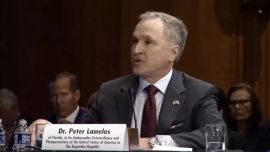President Javier Milei defended his administration’s record this week as he celebrated 100 days in office, claiming that he retains the support of the population despite ongoing economic turmoil.
Argentina’s political direction took a 180-degree turn when Milei took office on December 10. The La Libertad Avanza leader immediately slashed public spending and began tackling inflation – which is slowly decelerating (25.5 percent in December, 20.6 percent in January and 13.2 percent in February) – but 100 days into his Presidency social tensions are simmering and he is still struggling to pass his flagship economic reforms.
The past week has seen another series of demonstrations against his government and its austerity measures, with picket groups and social organisations calling for greater food aid and welfare.
In the absence of recent official figures, UCA’s Social Debt Observatory estimated this month some 57 percent of the country is now living in poverty.
"The hunger in the neighbourhoods is terrible. They haven't delivered goods to the soup kitchens for four months and the kids need it," said María Medina, from the leftist organisation Polo Obrero, during a demonstration in Buenos Aires on Monday.
Milei took office warning things would get much worse for Argentines before they get better, and they have. He started out by devaluating the peso by 54 percent, and removing price controls.
These measures, along with the removal of fuel and transport subsidies, have seen Argentines' purchasing power plummet, causing a slowdown in consumption and economic growth.
Monthly inflation is starting to cool, but annual inflation still stood at 276 percent in February.
"It is clear to me that seven out of ten Argentines are having a worse time. I know that people are clear about it," Milei told journalist Luis Majul in an interview this week, quoting a poll by the Aresco consultancy firm in which respondents refer to their personal economic situation.
Some experts say that Milei’s stabilisation plan is bearing fruit, but they warn it may come at a cost.
"Stabilisation is working, better than one originally imagined, but there are questions about governance," independent economist Marina Dal Poggetto said in a recent television interview.
Confident of support
Nevertheless, Milei remains confident he retains the support of the population, highlighting that the Aresco survey showed that 54 percent of respondents approved of his management, compared to 44 percent who responded negatively.
Others aren’t so positive, a poll by Zuban Córdoba last week showed that rejection of Moilei’s government had risen to 57.4 percent, a change of three points from the previous month. Moreover, 55 percent said they believed the government is going in the wrong direction.
That survey tracks with others. According to another new poll by the Atlas Intel consultancy firm, carried out between March 15 and 18, 47.7 percent approve of Milei’s administration, with disapproval just 0.1 points lower – too close to call. Almost five percent did not know how to answer the question.
This national study, with a +/- two-point margin of error and a reliability level of 95 percent, showed that 45.1 percent consider the government “bad or very bad,” while for 43.5 percent it is “excellent or good.” In the middle, 10.5 percent of people catalogued the performance by the libertarian leader as “regular."
Breaking down the performance, Milei’s government ranked positively in three areas: “transparency and combatting corruption,” “economic management and fiscal responsibility” and foreign relations.
Negative reviews were offered for “public security, employment, social policy and reduction of poverty,” “education and culture,” and “public works, health, tourism and the environment.”
Asked to compare his government to that of his predecessor, former president Alberto Fernández, Milei ranked higher in most areas, with the Peronist leader outperforming him on education, culture, employment, poverty reduction, health, public works, the environment and tourism.
Diving down into the performance of ministers, the survey showed that Milei’s top-performing official is Security Minister Patricia Bullrich, who was the only figure to report a positive differential (50 percent positive to 48 negative).
Economy Minister Luis Caputo and Human Capital Minister Sandra Pettovello produced negative reviews, ranking 43-53 and 41-47 respectively.
Church concerns
Adding its voice to growing concerns, the local branch of the Catholic Church used Milei’s centennial anniversary to warn of a “climate of extremely high social fracture" due to extension job layoffs and the government’s austerity measures.
A statement from the National Commission for Justice and Peace (CNJP), a body that depends on the Argentine Synod and is made up mostly of lay people, expressed concern over “a persistent fall in salaries in the public and private sector.”
"We are even more concerned that the shock of the austerity has fallen on the accounts of pensions and contributory pensions which, by its magnitude, accounts for a third of the cuts, registering a very serious decrease in retirement income and health and disability benefits," they said in a statement.
"The loss of jobs is a painful fact," it added, highlighting "worrying reports" from various economic sectors.
Milei’s “chainsaw” plans have delivered “permanent cuts in the areas of public policy management," impacting basic rights such as health and education and “primary needs such as food itself.”
"The situation in the soup kitchens is urgent, due to the increase in the number of people attending and the lack of food provision," said the group, echoing concerns voiced by Monsignor Oscar Ojea, the Bishop of San Isidro.
Criticising the “social aggressiveness” perpetrated by the president online, the Church group warned of “an enormous degree of social insensitivity on the part of the authorities in the adjustment measures” and slammed the “culture of hatred and extreme individualism generated.”
– TIMES/PERFIL/AFP




















Comments